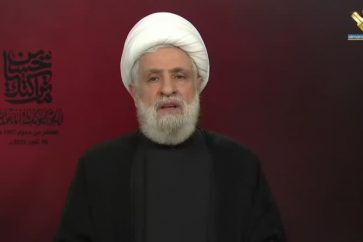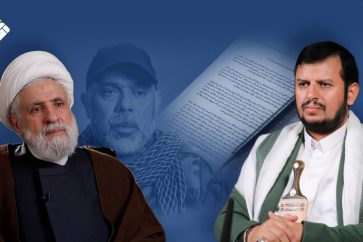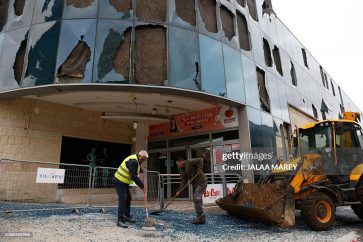The Ceasefire Supervision Committee convened on Monday, led by US envoy Amos Hochstein, amid boiling-point tensions raised by ‘Israeli’ post-ceasefire barbarism in southern Lebanon.
The meeting in the southern town of Naqoura marks the third session since the ceasefire on November 27, wherein Israeli occupation forces (IOF) saw the given 60 days as an opportunity to brazenly occupy Lebanese lands that they were never able to when in direct confrontation with Hezbollah resistance fighters.
The Lebanese delegation, carrying strong objections, has aimed to address Israeli obstruction of the Lebanese army’s deployment plan, Al-Akhbar Lebanese daily’s Amal Khalil reported on Monday.
Prime Minister Najib Mikati previously expressed these concerns to US and French representatives during a meeting at the Grand Serail. Despite the Lebanese anger, the IOF continues their violations, with recent bombings and demolitions in areas like Naqoura, Al-Jebbain, and Teir Harfa, in addition to Taybeh, Yaroun and Aitaroun where the Lebanese Armed Forces (LAF) were beginning deployment. Khalil cited a well-informed source who hinted that “the Israeli enemy will withdraw from Naqoura after this committee meeting, as it did from Khiyam after the first meeting.”
بالصور | مراسل قناة المنار : توثيق لتوغل الدبابات الاسرائيلية المعادية في بلدة #الطيبة وعمليات الاحراق والتفجير pic.twitter.com/m2otZgqnqm
— قناة المنار (@TVManar1) January 5, 2025
Extending Ceasefire
Reports suggest that Hochstein would propose extending the ceasefire to 90 days, conditional on the Lebanese army’s readiness to deploy.
The source quoted US General Jasper Jeffers, US head of the monitoring committee, as saying, “Israel will withdraw sooner or later, but according to arrangements that the border area will be subject to in cooperation between UNIFIL and the Lebanese army”.

This unclear “sooner or later” rhetoric directly contradicts the original terms of the ceasefire agreement and suggests that the US will most likely push harder for extended IOF presence in southern Lebanon, Al-Akhbar report added.
Jeffers commended the Lebanese army for adhering to UN Resolution 1701, contrasting “Israeli” claims of the LAF’s negligence. He highlighted his recent visit to Khiyam, where he witnessed LAF units confiscating large quantities of ammunition, as evidence of its commitment, according to the report.
Israeli Conditions
Citing leaks from Israeli media sources, Al-Akhbar’s Khalil reported suggested conditions for withdrawal, including establishing a buffer zone along the border. These sources claimed that “Israel will enforce a buffer zone across the border and not allow residents of southern towns to return,” though the Lebanese government has not received official confirmation of this plan. The sources added that a proposal yet to be presented by the supervision committee involves a buffer zone three kilometers deep as part of a revised map south of the Litani River, which would most likely be imposed through the signature illegal aggression of the IOF.
The updated map accompanying the November 27 ceasefire agreement raises deadly concerns. While the Lebanese government reaffirmed its commitment to Resolution 1701 and stability along the Blue Line, the map omits key landmarks, such as the Shebaa Farms and Ghajar. The Blue Line, originally a withdrawal demarcation, is being treated by the supervision committee as the de facto border rather than the border set by the 1949 Israeli-Lebanese General Armistice Agreement, according to the leaks.
The map also reportedly includes Yahmor Al-Shaqif, a town north of the Litani River, positioned just three kilometers from Metula, an Israeli settlement. This territorial adjustment complicates negotiations, especially as discussions turn to the party which will run the Ras Al-Naqoura crossing following the Israeli withdrawal. According to Khalil’s sources, “Israel does not trust handing over the crossing to UNIFIL and the LAF” and instead suggests oversight by a reinforced international force or the direct involvement of the US head of the committee.
While Lebanon remains firm in its demands for sovereignty and the cessation of hostilities, Israeli actions prove an entrenched refusal to comply with Resolution 1701.
As the committee meets, the outcomes of proposed truce extensions, border adjustments, and management of key crossings will determine the trajectory of this volatile situation. Lebanon’s delegation seeks to ensure that its territorial integrity and rights are upheld in the face of Zionist arrogance and US deception.
Earlier on Saturday, Hezbollah Secretary General Sheikh Naim Qassem warned that the resistance patience may run out before the end of the 60-day ceasefire deadline.
Source: Al-Akhbar Lebanese Newspaper (translated and edited by Al-Manar English Website)




